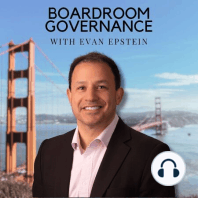48 min listen

Vice Chancellor J. Travis Laster of the Delaware Court of Chancery: Ten Years of Trados, A Discussion of Fiduciary Duties.
Vice Chancellor J. Travis Laster of the Delaware Court of Chancery: Ten Years of Trados, A Discussion of Fiduciary Duties.
ratings:
Length:
50 minutes
Released:
Feb 26, 2024
Format:
Podcast episode
Description
(0:00) Intro.(2:27) About the podcast sponsor: The American College of Governance Counsel.(3:13) Start of interview. [Interviewer: UC Law SF Professor Abe Cable. Reference to his article "Does Trados Matter?" (2019)].(4:17) Summary of the Trados case by Vice-Chancellor Laster. (9:44) Concept of "residual value maximization." Distinguishing between standard of conduct and standard of review.(16:17) Explaining standards of review: 1) Business judgment rule, 2) Enhanced scrutiny and 3) Entire fairness standard. The impact of conflicted transactions.(23:55) Distinguishing governance standards from public companies and Silicon Valley-style private startups. (28:10) Social factors or dynamics that make Silicon Valley VC-backed startups a relatively lower risk environment for litigation.(31:07) Why directors should always try to maximize the value of the corporation for the residual. Emotional commitment and engagement in many cases.(33:31) "What made Trados a difficult case and a litigable case was that this really was a sideways situation where the value was in the vicinity of an area where the common could take."(36:36) How to think about maximizing the residual value. *reference to Credit Lyonnais opinion by Chancellor Allen (1991).(39:04) Other trends or cases that present some litigation risk for startup corporate directors. "I don't know if there's anything super new. What we tend to see is sort of old problems recurring because these are really problems of human nature. And so things are cyclical."Redemption Rights. Example of cases: Thoughtworks (2010), ODN Holdings (2017)280G [and 409A] Valuations. "I would really like to see people treating [those valuations] as a more substantive exercise than merely as an exercise in marketing to your employees (for employees' morale)."(45:54) The importance of outside or independent directors. "I really think that somebody has to be in the room asking the proverbial dumb question, which usually isn't a dumb question. Usually it's the question that needs to be asked."The Honorable J. Travis Laster was sworn in as Vice Chancellor of the Court of Chancery on October 9, 2009. Prior to his appointment, he was one of the founding partners of Abrams & Laster LLP, a corporate law boutique specializing in high stakes litigation involving Delaware corporations and other business entities, and advising on transactional matters carrying a significant risk of litigation. Professor Abe Cable joined the UC Law SF faculty in 2011. Prior to joining the faculty at UC Law SF, he was a partner at Miller Nash LLP, in Portland, Oregon. In ten years of practice he worked on a broad range of matters, including private and public offerings of securities, angel and venture capital investments, sale of subprime mortgage-backed securities, and negotiation of software licenses. He is the Faculty Director of the UC Center for Business Law San Francisco.
You can follow Evan on social media at:Twitter: @evanepsteinLinkedIn: https://www.linkedin.com/in/epsteinevan/ Substack: https://evanepstein.substack.com/__You can join as a Patron of the Boardroom Governance Podcast at:Patreon: patreon.com/BoardroomGovernancePod__Music/Soundtrack (found via Free Music Archive): Seeing The Future by Dexter Britain is licensed under a Attribution-Noncommercial-Share Alike 3.0 United States License
You can follow Evan on social media at:Twitter: @evanepsteinLinkedIn: https://www.linkedin.com/in/epsteinevan/ Substack: https://evanepstein.substack.com/__You can join as a Patron of the Boardroom Governance Podcast at:Patreon: patreon.com/BoardroomGovernancePod__Music/Soundtrack (found via Free Music Archive): Seeing The Future by Dexter Britain is licensed under a Attribution-Noncommercial-Share Alike 3.0 United States License
Released:
Feb 26, 2024
Format:
Podcast episode
Titles in the series (100)
Esther Aguilera: "Latinos Are The Most Underrepresented Minorities on U.S. Corporate Boards": In this episode, I talk with Esther Aguilera, the President and CEO of the Latino Corporate Directors Association (LCDA). LCDA is a national, membership organization promoting C-level and board diversity. It serves as an advocate and resource to corporate boards, search firms, private equity, and institutional investors interested in gaining access to exceptional Latino board talent. For more information about LCDA please go to www.latinocorporatedirectors.org If you like this show, please consider subscribing, leaving a review or sharing this podcast with colleagues or friends. You can also subscribe to the Boardroom Governance Newsletter at evanepstein.substack.com by Boardroom Governance with Evan Epstein